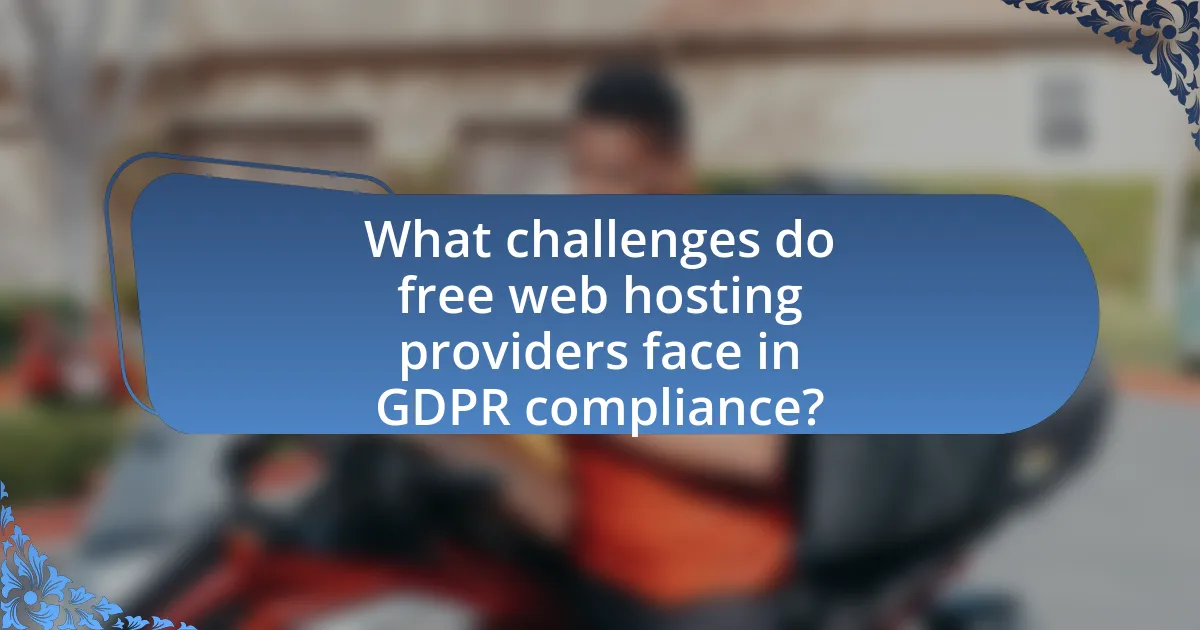The General Data Protection Regulation (GDPR) is a significant data protection law enacted by the European Union that impacts free web hosting security practices. This article examines the implications of GDPR for free web hosting providers, emphasizing the necessity for robust security measures to protect personal data, comply with stringent regulations, and avoid substantial fines for non-compliance. Key topics include the definition of personal data under GDPR, the principles that govern data processing, the obligations of hosting services, and the challenges faced in achieving compliance. Additionally, the article outlines best practices for enhancing security and user trust in the context of GDPR.

What is the GDPR and its relevance to free web hosting security practices?
The General Data Protection Regulation (GDPR) is a comprehensive data protection law enacted by the European Union in May 2018, aimed at enhancing individuals’ control over their personal data. Its relevance to free web hosting security practices lies in the stringent requirements it imposes on data processors and controllers, including those offering free services. Free web hosting providers must implement robust security measures to protect personal data, ensure transparency in data handling, and comply with data breach notification requirements, as non-compliance can result in significant fines, up to 4% of annual global turnover or €20 million, whichever is higher. This regulatory framework compels free web hosting services to prioritize security practices to safeguard user data and maintain compliance.
How does the GDPR define personal data?
The GDPR defines personal data as any information that relates to an identified or identifiable natural person. This includes data such as names, identification numbers, location data, and online identifiers, which can directly or indirectly identify an individual. The regulation emphasizes that personal data encompasses a wide range of information, highlighting its relevance in various contexts, including online activities and interactions.
What types of data are considered personal under the GDPR?
Under the General Data Protection Regulation (GDPR), personal data is defined as any information that relates to an identified or identifiable natural person. This includes names, identification numbers, location data, online identifiers, and other factors specific to the physical, physiological, genetic, mental, economic, cultural, or social identity of that person. The GDPR emphasizes that any data that can be used to directly or indirectly identify an individual falls under this definition, thereby ensuring comprehensive protection of personal information.
How does the definition of personal data impact free web hosting services?
The definition of personal data significantly impacts free web hosting services by imposing strict compliance requirements under regulations like the GDPR. Free web hosting providers must ensure that any data they collect, store, or process that qualifies as personal data is handled in accordance with GDPR principles, such as obtaining explicit consent and ensuring data security. For instance, the GDPR defines personal data as any information relating to an identified or identifiable natural person, which means that even basic user information can trigger compliance obligations. Failure to comply can result in substantial fines, which can threaten the viability of free hosting services that often operate on thin margins.
What are the key principles of the GDPR?
The key principles of the GDPR are lawfulness, fairness, and transparency; purpose limitation; data minimization; accuracy; storage limitation; integrity and confidentiality; and accountability. These principles ensure that personal data is processed legally, collected for specified purposes, limited to what is necessary, kept accurate, retained only as long as necessary, secured against unauthorized access, and that data controllers are responsible for compliance. Each principle is designed to protect individuals’ privacy rights and enhance data security, reflecting the GDPR’s commitment to safeguarding personal information in the digital age.
How do these principles apply to free web hosting providers?
The principles of GDPR apply to free web hosting providers by mandating that they ensure the protection of personal data of their users. Free web hosting providers must implement adequate security measures, such as encryption and access controls, to safeguard user data, as failure to comply can result in significant fines, with penalties reaching up to 4% of annual global turnover or €20 million, whichever is higher. Additionally, these providers are required to obtain explicit consent from users for data processing activities and must provide clear privacy notices detailing how user data will be used, stored, and shared. This compliance is essential not only for legal adherence but also for maintaining user trust and credibility in a competitive market.
What obligations do free web hosting services have under the GDPR?
Free web hosting services are obligated under the GDPR to ensure the protection of personal data they process on behalf of users. This includes implementing appropriate technical and organizational measures to safeguard data, ensuring transparency about data processing activities, and obtaining explicit consent from users for data collection and processing. Additionally, these services must facilitate users’ rights, such as the right to access, rectify, and erase their personal data, as stipulated in Articles 15-17 of the GDPR. Failure to comply with these obligations can result in significant fines and legal repercussions, as the GDPR enforces strict penalties for non-compliance, which can reach up to 4% of annual global turnover or €20 million, whichever is higher.
Why is GDPR compliance critical for free web hosting security practices?
GDPR compliance is critical for free web hosting security practices because it mandates the protection of personal data, ensuring that hosting providers implement robust security measures. This regulation requires organizations to adopt stringent data protection protocols, including encryption and access controls, to safeguard user information from breaches. Non-compliance can lead to significant fines, with penalties reaching up to 4% of annual global turnover or €20 million, whichever is higher, as outlined in Article 83 of the GDPR. Therefore, adhering to GDPR not only protects users but also mitigates financial risks for hosting providers.
What are the potential consequences of non-compliance for free web hosting services?
Non-compliance with GDPR for free web hosting services can lead to significant financial penalties, legal actions, and reputational damage. Specifically, organizations may face fines of up to 4% of their annual global turnover or €20 million, whichever is higher, as stipulated by GDPR regulations. Additionally, non-compliance can result in lawsuits from affected individuals, leading to further financial liabilities. The reputational damage can deter potential users and clients, impacting the service’s market position and trustworthiness. These consequences highlight the critical importance of adhering to GDPR requirements for free web hosting services.
How can compliance enhance user trust and security?
Compliance enhances user trust and security by ensuring that organizations adhere to established regulations and standards, such as the General Data Protection Regulation (GDPR). This adherence demonstrates a commitment to protecting user data and privacy, which fosters confidence among users. For instance, GDPR mandates strict data protection measures, including data encryption and user consent protocols, which significantly reduce the risk of data breaches. According to a study by the European Commission, 75% of consumers feel more secure when businesses comply with data protection regulations. This correlation between compliance and user trust underscores the importance of regulatory frameworks in enhancing security and building user confidence.

How has GDPR influenced security practices in free web hosting?
GDPR has significantly influenced security practices in free web hosting by mandating stricter data protection measures. Hosting providers are now required to implement robust security protocols to safeguard personal data, including encryption, access controls, and regular security audits. For instance, many free web hosting services have adopted enhanced encryption standards and improved user authentication processes to comply with GDPR’s requirements for data protection by design and by default. This shift is evidenced by a rise in the adoption of secure socket layer (SSL) certificates among free hosting providers, which encrypts data transmitted between users and servers, thereby reducing the risk of data breaches.
What security measures are mandated by the GDPR for free web hosting providers?
The General Data Protection Regulation (GDPR) mandates that free web hosting providers implement several security measures to protect personal data. These measures include ensuring the confidentiality, integrity, and availability of data through appropriate technical and organizational measures, such as encryption, pseudonymization, and regular security assessments. Additionally, providers must establish protocols for data breach notifications within 72 hours and ensure that any third-party processors comply with GDPR standards. These requirements are outlined in Articles 32 and 33 of the GDPR, which emphasize the necessity of safeguarding personal data against unauthorized access and processing.
How do encryption and data protection impact free web hosting security?
Encryption and data protection significantly enhance free web hosting security by safeguarding sensitive information from unauthorized access. Free web hosting services often lack robust security measures, making them vulnerable to data breaches. Implementing encryption protocols, such as SSL/TLS, ensures that data transmitted between users and servers is secure, reducing the risk of interception. Additionally, data protection regulations like GDPR mandate that web hosting providers implement adequate security measures to protect personal data, thereby compelling free hosting services to adopt better security practices. For instance, GDPR requires data encryption as a safeguard, which can lead to improved overall security for users on free hosting platforms.
What role does data breach notification play in security practices?
Data breach notification plays a critical role in security practices by ensuring timely communication of security incidents to affected individuals and regulatory bodies. This transparency fosters accountability and encourages organizations to adopt stronger security measures to prevent future breaches. Under the General Data Protection Regulation (GDPR), organizations are mandated to notify authorities within 72 hours of discovering a breach, which emphasizes the importance of rapid response and risk mitigation. This requirement not only helps protect individuals’ personal data but also serves as a deterrent against lax security practices, as organizations face significant penalties for non-compliance, with fines reaching up to 4% of annual global turnover.
How have free web hosting providers adapted to GDPR requirements?
Free web hosting providers have adapted to GDPR requirements by implementing enhanced data protection measures and transparency protocols. These providers now ensure that user consent is obtained before collecting personal data, aligning with GDPR’s emphasis on explicit consent. Additionally, they have updated their privacy policies to clearly outline data usage, storage, and user rights, which is a requirement under GDPR. Many free hosting services have also invested in secure data storage solutions and encryption technologies to protect user information from breaches, reflecting the GDPR’s mandate for data security. Furthermore, some providers have established processes for users to access, modify, or delete their data, ensuring compliance with the regulation’s data subject rights.
What changes have been made to data handling and storage practices?
Changes to data handling and storage practices include the implementation of stricter consent requirements, enhanced data protection measures, and increased transparency in data processing activities. Under the General Data Protection Regulation (GDPR), organizations must obtain explicit consent from users before collecting their personal data, ensuring that individuals are fully informed about how their data will be used. Additionally, companies are now required to adopt robust security protocols, such as encryption and regular security audits, to protect stored data from breaches. These changes are supported by the GDPR’s emphasis on accountability and the necessity for organizations to demonstrate compliance through documented policies and procedures.
How are free web hosting services ensuring user consent and rights?
Free web hosting services ensure user consent and rights primarily by implementing clear privacy policies and obtaining explicit consent for data collection. These services typically provide users with detailed information about what data is collected, how it is used, and the rights users have under regulations like the General Data Protection Regulation (GDPR). For instance, many free hosting providers include consent checkboxes during the sign-up process, ensuring users actively agree to the terms before their data is processed. Additionally, they often offer mechanisms for users to access, modify, or delete their personal data, aligning with GDPR requirements that emphasize user control over personal information.

What challenges do free web hosting providers face in GDPR compliance?
Free web hosting providers face significant challenges in GDPR compliance primarily due to limited resources and lack of control over data processing. These providers often operate on tight budgets, which restricts their ability to implement necessary security measures and legal frameworks required by GDPR. Additionally, many free hosting services rely on third-party services for data storage and processing, complicating their ability to ensure compliance since they cannot fully control how personal data is handled by these external entities. The European Data Protection Board emphasizes that data controllers must ensure that any third-party processors also comply with GDPR, which adds another layer of complexity for free hosting providers.
What are the common obstacles in implementing GDPR-compliant security practices?
Common obstacles in implementing GDPR-compliant security practices include lack of awareness, insufficient resources, and complex regulatory requirements. Organizations often struggle with understanding the full scope of GDPR, leading to inadequate training and implementation strategies. Additionally, many companies face budget constraints that limit their ability to invest in necessary security technologies and personnel. The complexity of GDPR regulations can also create confusion, making it challenging for organizations to ensure compliance across all aspects of their operations. These factors contribute to difficulties in achieving and maintaining GDPR compliance in security practices.
How do resource limitations affect compliance efforts for free web hosting services?
Resource limitations significantly hinder compliance efforts for free web hosting services, as these services often lack the financial and technical resources necessary to implement robust data protection measures mandated by regulations like GDPR. For instance, without adequate funding, free web hosting providers may struggle to invest in secure infrastructure, employee training, and necessary compliance tools, leading to vulnerabilities in data handling and storage practices. A study by the European Union Agency for Cybersecurity indicates that organizations with limited budgets are less likely to adopt comprehensive security protocols, which directly impacts their ability to meet GDPR requirements effectively.
What technical challenges arise in securing personal data?
Securing personal data presents several technical challenges, including data encryption, access control, and compliance with regulations like GDPR. Data encryption is essential to protect sensitive information from unauthorized access, yet implementing robust encryption methods can be complex and resource-intensive. Access control mechanisms must be meticulously designed to ensure that only authorized users can access personal data, which requires ongoing management and monitoring to prevent breaches. Additionally, compliance with GDPR imposes strict requirements on data handling and storage, necessitating technical solutions that can adapt to evolving legal standards while ensuring data integrity and security. These challenges highlight the need for continuous investment in security technologies and practices to effectively safeguard personal data.
How can free web hosting providers overcome these challenges?
Free web hosting providers can overcome challenges posed by GDPR by implementing robust data protection measures and ensuring compliance with privacy regulations. These providers can adopt encryption techniques for data storage and transmission, which secures user information against unauthorized access. Additionally, they can establish clear data processing agreements with users, outlining how personal data will be handled, thereby fostering transparency and trust. Regular audits and assessments of security practices can further help identify vulnerabilities and ensure adherence to GDPR requirements. By investing in user education about data rights and privacy, free web hosting providers can empower users to make informed decisions regarding their data, ultimately enhancing compliance and security.
What best practices can be adopted for effective GDPR compliance?
To achieve effective GDPR compliance, organizations should implement data minimization, ensuring only necessary personal data is collected and processed. This practice reduces the risk of data breaches and aligns with GDPR principles, which emphasize the importance of limiting data collection to what is essential for specific purposes. Additionally, organizations must establish clear consent mechanisms, allowing individuals to provide informed consent for data processing, which is a fundamental requirement under GDPR. Regular audits and assessments of data processing activities are also crucial, as they help identify compliance gaps and ensure ongoing adherence to GDPR regulations. Furthermore, providing training for employees on data protection and privacy rights enhances awareness and fosters a culture of compliance within the organization. These best practices collectively contribute to a robust GDPR compliance framework, safeguarding personal data and minimizing legal risks.
How can collaboration with legal and security experts enhance compliance efforts?
Collaboration with legal and security experts enhances compliance efforts by ensuring that organizations adhere to regulatory requirements while implementing robust security measures. Legal experts provide insights into the specific obligations under regulations like GDPR, helping organizations understand the legal implications of their data handling practices. Security experts contribute by identifying vulnerabilities and recommending technical safeguards that align with legal standards. For instance, a study by the International Association of Privacy Professionals (IAPP) found that organizations with integrated legal and security teams are 30% more likely to achieve compliance with GDPR requirements. This collaboration fosters a comprehensive approach to compliance, minimizing risks and enhancing overall data protection strategies.
What practical tips can free web hosting providers implement for better security practices?
Free web hosting providers can enhance security practices by implementing regular software updates and using strong encryption protocols. Regular updates ensure that vulnerabilities in the hosting software are patched promptly, reducing the risk of exploitation. For instance, according to a report by the Cybersecurity & Infrastructure Security Agency, 85% of successful cyberattacks exploit known vulnerabilities that could be mitigated by timely updates. Additionally, employing strong encryption protocols, such as TLS, protects data in transit, ensuring that sensitive information remains secure from interception. This aligns with GDPR requirements for data protection, emphasizing the importance of safeguarding personal data.


